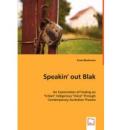 3744944917595042744.jpg
3744944917595042744.jpg
Cover image courtesy of publisher.
y
 Speakin' Out Blak : An Examination of Finding an 'Urban' Indigenous 'Voice' Through Contemporary Australian Theatre
single work
Speakin' Out Blak : An Examination of Finding an 'Urban' Indigenous 'Voice' Through Contemporary Australian Theatre
single work
 Speakin' Out Blak : An Examination of Finding an 'Urban' Indigenous 'Voice' Through Contemporary Australian Theatre
single work
Speakin' Out Blak : An Examination of Finding an 'Urban' Indigenous 'Voice' Through Contemporary Australian Theatre
single work
Issue Details:
First known date:
2008...
2008
Speakin' Out Blak : An Examination of Finding an 'Urban' Indigenous 'Voice' Through Contemporary Australian Theatre

